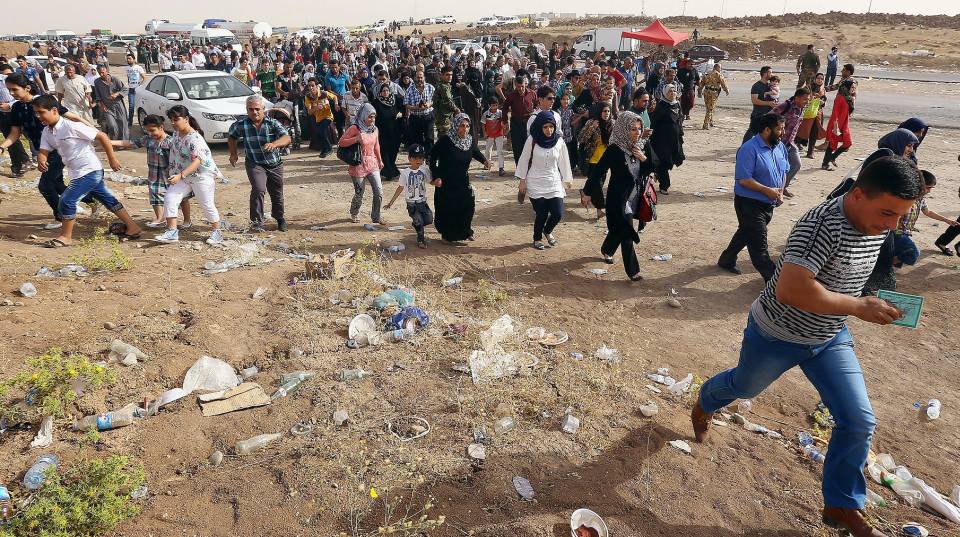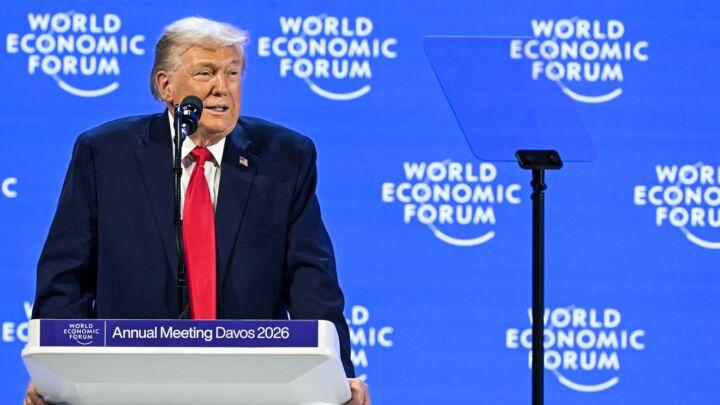Iraq: there is no Western solution, and never was one
Western intervention has destroyed Iraq, as spiked predicted it would.

Want unlimited, ad-free access? Become a spiked supporter.
What will it take to wake Western leaders and observers to the bloody folly of their foreign interventionism? Even as Iraq turns more calamitous, with vast swathes of land being conquered by an Islamist group that makes al-Qaeda look like the Women’s Institute in comparison, many in the West continue to delude themselves about Western interference overseas. This goes beyond Tony Blair’s self-protecting insistence that the current barbarism in Iraq has nothing to do with him or his 2003 invasion. Among Blair’s legion critics, too, the instinct is to focus on the alleged mistakes made during this intervention rather than on the destructiveness of interventionism itself. Watching Iraq descend into mayhem, liberals blame Bush and Blair’s ‘hubris’ in 2003 and their refusal to wait for a UN mandate for toppling Saddam, while right-wingers blame President Barack Obama, claiming his early withdrawal of US troops was an act of ‘criminal negligence’ that allowed Islamist militants to return. Both of these responses suggest that the lethal instability in Iraq is a product of Western politicians’ mishaps and miscalculations rather than of Western interventionism per se.
It’s time to cut through all this simplistic heaping of blame at the feet of individual politicians or specific policy decisions, and assert a more important truth: it was the act of intervention itself, the ideology and practice of Western interventionism, which destroyed Iraq and cultivated the calamity now enveloping large parts of that benighted nation. The suggestion that things might have turned out differently if the 2003 toppling of Saddam’s Ba’athist regime had been executed with a greater international consensus, or if cautious Obama had thought twice before overturning the alleged strongman Bush’s Iraq policy, overlooks the fact that Western intervention is inherently destructive, by its very nature, always having the effect of making conflicts worse through internationalising them and intensifying local divisions. For spiked, this isn’t a case of using hindsight to say, ‘If only the West had done things differently, then maybe things wouldn’t have turned out so bad’, as everyone else is doing. Rather, we argued from the very start that Iraq would be colossally destabilised by Western interventionism. In February 2003, a month before the invasion started, we said Western meddling would create an Iraq where ‘Iraqis are more divided than ever and local conflicts are exacerbated’. This can now be seen, in gory Technicolor, the inexorable consequence of the ideology of interventionism.
As ISIS – the Sunni-led Islamic State in Iraq and the Levant – has taken Iraq’s second largest city, Mosul, and also Tikrit, Western political observers have been desperately deploying hindsight to try to discover the one person or decision that might be held responsible for this apparent case of interventionism gone bad. The UK liberal broadsheet the Independent pins the blame on ‘Bush and Blair’s hubris’ and their ‘mistakes made after 2003’, which has the effect of indicting the overseers of the intervention in Iraq rather than the intervention itself – so much so that the Independent, like many of the other ostensible critics of the Iraq War, can now call for more intervention, a better form of intervention, to tackle the threat posed by ISIS. There is a ‘compelling argument’ for military intervention in Iraq, it says, to stop ISIS’s ‘winning streak’. For the American right, it was Obama’s 2012 withdrawal of US troops that caused the current crisis. Having ‘let our military presence in Iraq lapse’, Obama created a space for the rise of Islamic militants, says the National Review (somewhat overlooking the growth of Islamic militancy in Iraq since at least 2005). This critique of the style of interventionism under Obama also leads to a demand for more, better Western intervention today, for a firmer, boots-on-the-ground occupation, in National Review‘s dream world.
The neverending discussions about the style, attitude and tactics of the intervention in Iraq, about the arrogance of Blair or the cowardice of Obama, distracts from a more profound appraisal of the destructiveness of the very act of Western intervention. No doubt numerous technical mistakes were made by British and US forces during and after their 2003 invasion, but it was the prior logic of interventionism, the presumption of a right to use force to topple a foreign regime, which devastated Iraq and directly caused the current crisis. For the main achievement of today’s PR imperialism, of a Western interventionism governed more by the narrow political needs of morally bereft Western politicians and observers than by any kind of serious geopolitical considerations, is to unravel existing orders in foreign countries and to unleash tensions and divisions that had previously been kept in check.
In Iraq, the sweeping aside of a regime that had dominated every aspect of Iraqi politics and society for decades had the inevitable consequence of setting in motion a deeply dangerous process of fragmentation. Divisions that had been subsumed by the rule of Saddam’s Ba’athist Party came gushing to the surface. Most notably, tensions between the Sunni minority (from which Saddam and his party hailed) and the Shia majority became both more public and more pronounced following the destruction of Saddam’s regime. An early sign of this came in 2005, with the first, much-celebrated post-invasion election in Iraq, in which turnout was as high as 95 per cent in Shia areas and as low as two per cent in Sunni areas, and where 80 per cent of Iraqis voted for parties that most closely resembled and spoke to their own ethnic or religious background. As spiked argued at the time, this fragmenting of Iraq into opposing ethnic and religious camps, this politicisation of religious difference, was the inexorable consequence of the West’s removal of ‘the dominant political force in Iraq’. ‘Today, with no unifying or political force, whether of the ruthless Saddam variety or any other, Iraqis have fallen back on ethnic associations, one of the few things left by a war that removed the ruling regime and replaced it with nothing’, we said in 2005.
The fragmentary process, the post-Saddam mobilisation of ethnic or religious antagonisms, continued throughout the 2000s. Indeed, it was always striking that the so-called ‘resistance’ to the Western occupation, which was always more a case of Sunni forces targeting Shia officials and civilians rather than any kind of serious national-liberation strike against America or Britain, was based around the largely Sunni cities of Fallujah, Mosul and Tikrit – the same territories recently taken by the Sunni-led ISIS, which is demanding that Shias ‘repent or die’ and is allegedly executing those who worked with the Shia-dominated, Western-backed government in Baghdad. For all the depictions of ISIS’s current conquering of Iraqi towns and cities as something new, something unexpected, in fact it is better seen as a territorial formalisation of the divisions unleashed by the West’s intervention in 2003. The post-Saddam fragmentation expressed at both elections and in a resistance that often looked more like a civil war between Sunnis and Shias is now being entrenched in a more physical, geographical fashion. Indeed, it is striking that Islamist ISIS has apparently formed an alliance with those who were part of Sunni Saddam’s regime, while around Baghdad various Shia militias have gathered, promising to protect the capital from ISIS’s advance. What is talked about in the Western media as some kind of Islamist invasion of Iraq is in fact the intensification of the fragmentary process set in motion by the West’s unravelling of the existing order.
Western interventionism did not only ratchet up deep domestic divisions in Iraq – it also internationalised those tensions, its destruction of the existing order acting as an invitation to other regional players to involve themselves in falling-apart post-Saddam Iraq in order to shore up their own interests. So currently, Shia-ruled Iran, which now finds itself in the unusual position of being an informal ally of the West against ISIS, is sending ‘hundreds if not thousands of troops’ to ‘support the Iraqi government forces [in Baghdad]’ as they fortify themselves against an onslaught by Sunni ISIS. Meanwhile, Turkey looks set to be drawn into conflict in northern Iraq following ISIS’s kidnapping of 80 Turkish nationals in Mosul. This state of affairs was also predicted by spiked in its arguments against Western intervention. A month before the invasion started in 2003, we said that ‘by turning Iraq into an international issue, America and Britain have paved the way for a carve-up, [with] local players like Turkey, Iran and Saudi Arabia all want[ing] a piece of postwar Iraq’. Tragically, this has come to pass. What we have in Iraq today is not just unleashed local tensions but also the internationalisation of those tensions: forces in Sunni Saudi Arabia are strongly suspected of funding ISIS while Shia Iran funds and backs up Shia militias around Baghdad. This is another direct consequence of Western interventionism: through unravelling the existing order, and leaving a power vacuum in its wake, the West’s actions implicitly invited regional powers to move into Iraq in order to try to shape this hole where a state used to be to their own best interests. Currently, that is taking the form of a proxy war between Saudi Arabia and Iran for dominant influence in unravelled Iraq.
So Western interventionism itself brought about the current bloodshed in Iraq, which is the direct result of the unleashing of local tensions brought about by the destruction of the ruling regime and the opening-up of Iraq to regional interference brought about by the West’s transformation of it into an enormous political vacuum in the region. Over the past 10 years, no attempt by the West to impose artificial governments in Iraq could disguise the process of fragmentation started by Western intervention. In fact, such attempts at phoney governance also exacerbated tensions. The largely Shia-dominated artificial governments in Baghdad created merely a mirage of normalcy; they were Potemkin governments, designed to give the impression that democracy had been delivered to Iraq. But lacking legitimacy, existing primarily as an ornamental lid on the postwar chaos, these governments and their forces have rarely been capable of exerting authority anywhere outside of the confines of Baghdad. Indeed, many observers have been struck by the speed with which Iraqi soldiers and police capitulated to the forces of ISIS in Mosul, Tikrit and elsewhere: many of them simply ‘ran away’. This is because there is little political substance to such forces; they are illusory impositions, the Iraqi army uniform meaning little other than a means of making a wage. Artificial governments that largely excluded Sunni forces both contributed to the fragmentation of Iraq, by pitting one ethnic constituency against another, and also, through advertising their weaknesses, invited challenges to their authority. As ISIS now boasts of its taking of various cities: ‘The liquidation of the Shias who ran away from their military bases.’
So, why now? The divisions and tensions unleashed by the post-2003 process of fragmentation have generated a huge amount of violence over the past 10 years, but why are they taking an even more intense form today, effectively becoming an explicit civil war? It’s because of Syria, and more precisely because of the process of fragmentation set in motion by the West there, too.
ISIS’s cockiness in taking Iraqi cities has surprised many, with one leader writer describing it as ‘remarkable’ and ‘terrifying’ but also ‘impressive’. ISIS’s seeming tactical skill, certainly in comparison with Iraqi military forces, and its missionary zeal are a consequence of the boost it received through fighting against Assad’s forces (and against other rebel groups) in Syria. As the New York Times says, with ‘the outbreak of civil war in Syria, [ISIS] saw new opportunities for growth’, for training, winning new recruits and ‘seizing resources like arms caches’. Who, or what, turned Syria into a hotbed of instability and violence in which a group like ISIS could spy a chance to expand its operations and garner new military resources? Again, it was Western interventionism, which over the past three years has continually contributed to the fragmentation of Syria through calling into question the legitimacy of Assad’s regime and in the process boosting the authority, often with actual funding and weapons, of the various rebel groups. This Western-demonised, war-torn state was the ideal theatre for a group like ISIS to hone its skills and take them back to Iraq, as it has now done. Currently, ISIS controls large amounts of territory in both Syria and Iraq, with Ar-Raqqah, in Syria, as the capital of its so-called caliphate.
The rise of ISIS and the descent of large parts of Iraq into a severe Islamic state at war with Baghdad might just represent the West’s greatest geopolitical own goal in living memory. The Iraq War was launched partly on the phoney basis that Saddam’s Iraq was harbouring al-Qaeda groups; it wasn’t, but ‘liberated’ Iraq today is increasingly dominated by an Islamist group so extreme that al-Qaeda kicked it out. The current horrors in Iraq reveal just how irrational Western geopolitics has become, how divorced Western interventionism now is from any sense of a carefully worked-out Western interest. The end result of Western interventionism in both Iraq and Syria has been to boost the self-declared enemies of the West, to empower Iran in Iraq and beyond, and to bring about the unravelling of an entire region of the world – all things detrimental to Western foreign policy and diplomacy. Watching ISIS makes gains in Syria and Iraq, one British newspaper says the group is clearly ‘capable of destabilising the entire region’. This gets things the wrong way round – ISIS is better seen as a beneficiary of the West’s destabilisation of the entire region, its unravelling of the existing orders in both Iraq and Syria with no regard whatsoever for what the consequences of such an unravelling might be.
Now that extreme Islamists are taking over large parts of Iraq, many in the West are wondering out loud if what Iraq needs is another dictatorship, a soft dictatorship, perhaps, that might keep such dangerous militants in their place. There is much reminiscing for the days of Saddam. This isn’t an argument that spiked has any truck with. Recognising that Western interventionism has made things worse in Iraq than they were does not mean saying things were fine under Saddam, or that a return to such authoritarianism is desirable. Rather, our concern has always been with liberation for the Iraqi people, and with arguing against the idea that Western intervention could ever deliver such liberty. As we said on the eve of the invasion in 2003, the idea of a Western-delivered liberation is a contradiction in terms, since it ‘depicts the people of Iraq as hapless saps who should only expect freedom as the by-product of a Western war’, when in truth freedom is something a people can only win for themselves through the very act of fighting for it. With Iraq now caught between demands that it return to some kind of soft, West-friendly dictatorship and Islamists’ bloody efforts to turn it into a severe caliphate, it is hard to know even where to begin in making the case for Iraqi liberation today. But there is at least one thing that we in the West can do: take a principled, unflinching stance against Western intervention overseas every single time it is proposed, on the basis that it always, everywhere from Iraq to Afghanistan to Libya, makes conflicts worse.
Brendan O’Neill is editor of spiked.
£1 a month for 3 months
You’ve hit your monthly free article limit.
Support spiked and get unlimited access.
Support spiked – £1 a month for 3 months
spiked is funded by readers like you. Only 0.1% of regular readers currently support us. If just 1% did, we could grow our team and step up the fight for free speech and democracy.
Become a spiked supporter and enjoy unlimited, ad-free access, bonus content and exclusive events – while helping to keep independent journalism alive.
———————————————————————————————————————————–
Exclusive January offer: join today for £1 a month for 3 months. Then £5 a month, cancel anytime.
———————————————————————————————————————————–
Monthly support makes the biggest difference. Thank you.










Comments
Want to join the conversation?
Only spiked supporters and patrons, who donate regularly to us, can comment on our articles.